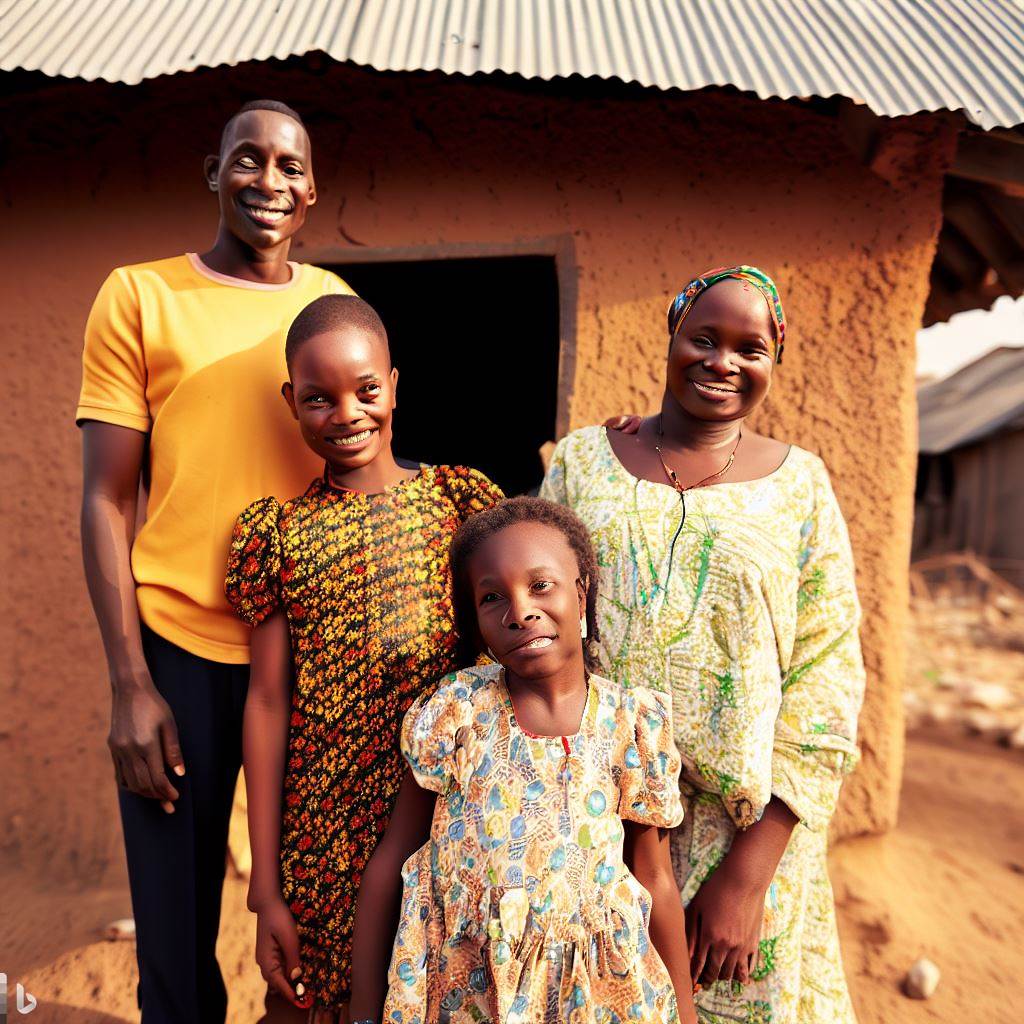Introduction
Affordable housing is a pressing concern in Nigeria, as the country grapples with a burgeoning population and increasing urbanization.
With rapid urban growth, the demand for housing has skyrocketed, resulting in a severe shortage of affordable homes for the average Nigerian.
This dire situation calls for a closer examination of whether affordable housing is a mere myth or a tangible reality in the Nigerian context.
The importance of affordable housing cannot be overstated. It serves as a fundamental need for individuals and families, providing them with a sense of security, stability, and dignity.
Adequate housing promotes better health, education, and economic opportunities, contributing to overall societal well-being.
Access to affordable housing is not just a basic human right, but it also has far-reaching effects on social stability and the nation’s development.
Unfortunately, the current housing landscape in Nigeria leaves much to be desired. Many low and middle-income Nigerians are unable to afford decent housing due to exorbitant costs and limited access to loans.
The lack of affordable housing options pushes individuals into informal settlements, resulting in congested slums with poor sanitation and infrastructure.
In this article, we will delve deeper into the factors contributing to the affordable housing crisis in Nigeria.
We will assess existing government policies, private sector involvement, and potential solutions to bridge the gap between the demand and supply of affordable housing.
By examining both the challenges and potential solutions, we aim to shed light on the reality of affordable housing in Nigeria and identify steps that can be taken to address this pressing issue.
Stay tuned for an eye-opening exploration of Nigeria’s affordable housing landscape.
The Scope of the Affordable Housing Problem in Nigeria
Nigeria currently faces a severe housing crisis, with a deficit of over 17 million units.
The World Bank estimates that Nigeria would need over 700,000 new housing units annually to meet demand.
However, only about 100,000 new houses are built each year, exacerbating the housing shortage.
Your Personalized Financial Plan
Get expert financial advice tailored exclusively to your goals. Receive a custom roadmap in just 1-3 business days.
Get StartedFactors contributing to the lack of affordable housing
- Rapid population growth: Nigeria has one of the highest population growth rates in the world, increasing housing demand. This population growth puts pressure on land and infrastructure, driving up housing costs.
- Urbanization and rural-urban migration: As more people move from rural areas to cities in search of better opportunities, the demand for housing increases. This influx of migrants strains the already limited housing resources, making housing less affordable.
- Economic factors: Nigeria’s economy has experienced periods of instability, affecting the affordability of housing. Inflation, high construction costs, and limited access to financing make housing unaffordable for many.
Consequences of insufficient affordable housing
- Homelessness: The lack of affordable housing options leaves many Nigerians without a secure place to live. This leads to homelessness, with individuals and families forced to live on the streets or in informal settlements.
- Slum proliferation: The scarcity of affordable housing has resulted in the proliferation of slums in Nigeria’s urban areas. These slums lack basic amenities, posing health and safety risks to their residents.
- Socioeconomic implications: The housing crisis has broader socioeconomic implications for Nigeria. Without access to affordable housing, individuals and families struggle to meet other basic needs. This perpetuates a cycle of poverty, limiting opportunities for social and economic advancement.
In essence, addressing the affordable housing problem in Nigeria requires a multifaceted approach.
Efforts must be made to increase the supply of affordable housing units through public and private investment.
Government policies should also focus on promoting sustainable urban development and improving access to financing.
Additionally, efforts should be made to address the root causes of the housing crisis, such as population growth and rural-urban migration.
By addressing these factors, Nigeria can work towards making affordable housing a reality for its citizens.
Read: The Pros and Cons of Home Ownership in Nigeria
Government Initiatives to Address the Housing Crisis
Previous and current government policies targeting affordable housing
The Nigerian government has implemented the National Housing Policy to address the issue. Previous policies included the National Housing Fund, designed to provide accessible mortgage loans.
The Federal Mortgage Bank of Nigeria was established to facilitate affordable housing financing.
The National Urban Development Policy aimed to improve infrastructure and housing conditions in urban areas.
The government also introduced the Family Homes Funds to support affordable housing projects.
Effectiveness and challenges faced by these initiatives
The effectiveness of government policies targeting affordable housing in Nigeria has been limited.
Shortage of funds and inadequate implementation have hindered the achievement of desired outcomes.
Corruption and mismanagement of resources have also impacted the effectiveness of these initiatives.
Some policies mainly focused on mortgage financing, neglecting other aspects of affordable housing.
Unlock a Debt-Free Future with Our Unique Strategies
Imagine a life unburdened by debt—a reality we help you visualize and achieve. We offer personalized strategies tailored to your unique situation, guiding you step-by-step toward financial freedom.
Start TodayGovernment initiatives have not been able to keep up with the increasing demand for affordable housing.
Low-income earners still struggle to access affordable housing options due to limited availability.
Potential of government partnerships with private sectors or NGOs in addressing the problem
Government partnerships with private sectors or NGOs have the potential to improve affordable housing in Nigeria.
Private sectors can contribute expertise, resources, and technology to housing development projects.
Collaboration with NGOs can help reach marginalized communities and provide innovative solutions.
Partnerships can enable the government to leverage private sector investments and improve efficiency. Joint initiatives can diversify funding sources, reducing the burden on the government alone.
However, challenges such as bureaucracy, lack of transparency, and conflicting interests must be addressed.
Overall, government initiatives to address the housing crisis in Nigeria have faced numerous challenges.
While there have been policies and funds dedicated to affordable housing, their effectiveness has been limited.
To enhance the impact, the government should consider partnering with private sectors and NGOs to leverage resources and expertise in tackling this complex issue.
Read: Securing Your Financial Future through Home Ownership in Nigeria
Case Studies: Successful Examples of Affordable Housing in Nigeria
Existing affordable housing projects in Nigeria
- LagosHOMS: A government-led initiative providing affordable homes for low and middle-income earners.
- Family Homes Funds: A public-private partnership creating affordable housing solutions in urban areas.
- Africa Real Estate Investment and Infrastructure Summit: Showcasing various affordable housing projects.
- Federal Mortgage Bank of Nigeria: Offering mortgage loans to individuals for affordable housing.
- Nigerian Mortgage Refinance Company: Facilitating mortgage refinancing for affordable homes.
Key features and factors contributing to their success
- Subsidized Pricing: These projects offer homes at significantly lower prices compared to the market value.
- Partnerships: Collaboration between government agencies, private developers, and financial institutions.
- Infrastructure Development: Ensuring basic amenities like water, electricity, and road connectivity.
- Access to Finance: Providing mortgage loans with flexible repayment terms for buyers.
- Community Engagement: Involving local communities in the planning and decision-making processes.
The positive impact of these projects on communities and individuals
- Increased Homeownership: Affordability allows more individuals and families to own their homes.
- Improved Living Conditions: Access to decent housing enhances the quality of life for residents.
- Economic Growth: Construction of affordable housing projects creates employment opportunities.
- Social Cohesion: Building strong communities through shared spaces and community development programs.
- Sustainability: Promoting environmentally friendly practices in construction and energy efficiency.
Read: Preparing for Unforeseen Costs in Nigerian Home Ownership

Affordable Housing Solutions: Strategies and Recommendations
Alternative strategies to increase the availability of affordable housing in Nigeria:
- Encourage public-private partnerships to invest in affordable housing projects.
- Implement tax incentives for developers who build affordable housing units.
- Establish a national housing fund to provide financial support for affordable housing initiatives.
- Promote community-led housing projects, fostering self-help and cooperative initiatives.
- Invest in infrastructure development to reduce the cost of housing construction.
- Facilitate access to land for affordable housing projects through streamlined processes.
Importance of sustainable and innovative housing solutions:
- Promote the use of renewable energy sources in affordable housing projects to reduce utility expenses.
- Encourage the adoption of eco-friendly building materials and sustainable construction practices.
- Foster innovation in design and construction techniques to optimize space and reduce costs.
- Implement recycling and waste management systems within affordable housing communities.
- Promote the use of smart technologies to enhance energy efficiency and reduce maintenance costs.
Policies that prioritize affordable housing as a fundamental right:
- Work towards establishing a legal framework that recognizes affordable housing as a basic human right.
- Encourage the government to allocate a significant portion of the national budget towards affordable housing initiatives.
- Push for the implementation of comprehensive housing policies that cater to the needs of low-income earners.
- Promote public awareness campaigns to educate citizens about the importance of affordable housing.
- Advocate for the inclusion of affordable housing targets in urban development plans.
By adopting these strategies and recommendations, Nigeria can address the affordable housing crisis and provide its citizens with access to safe, secure, and affordable housing options.
Read: Exploring Different Types of Homes in Nigeria: A Guide
Unlock Untapped Nigerian Wealth with Our Expert Advice
Imagine accessing investment opportunities others overlook—stocks, bonds, real estate, small businesses tailored to you. We offer personalized advice you won't find elsewhere, guiding you to financial success.
Unlock WealthOvercoming Challenges and Building a Brighter Future
Collaborative Efforts among Government, Private Sectors, and Community Organizations
Government, private sectors, and community organizations must unite to address the affordable housing crisis.
Collaboration ensures a comprehensive approach, pooling resources, expertise, and knowledge for sustainable solutions.
Government can provide funding, regulations, and policies, while private sectors offer innovation, technology, and investments.
Community organizations play a vital role in understanding local needs and advocating for equitable housing opportunities.
Working together, these stakeholders can create a more efficient and supportive housing ecosystem in Nigeria.
Public Awareness and Involvement in Solving the Housing Crisis
Public awareness is crucial to address the affordable housing crisis effectively. Informing the public about the scale of the problem cultivates empathy and fosters a sense of urgency.
Education programs, campaigns, and media platforms can be utilized to reach a wide audience and spark conversation.
Citizens must be encouraged to actively participate in finding solutions, volunteering, and supporting housing initiatives.
Engaging the public creates a shared responsibility and fosters a culture of solidarity towards affordable housing.
Long-Term Benefits and Positive Outcomes of Achieving Affordable Housing in Nigeria
Attaining affordable housing yields several long-term benefits for individuals and society as a whole.
Stable housing improves health outcomes, boosts educational opportunities, and reduces crime rates.
As more people secure affordable homes, poverty levels decrease, contributing to overall socio-economic development.
Increased access to housing enhances social cohesion, strengthens communities, and promotes inclusive growth.
Furthermore, affordable housing stimulates the construction sector, creating jobs and driving economic growth.
By achieving affordable housing, Nigeria can pave the way for a brighter future, where everyone has a place to call home.
You Might Also Like: From Tenant to Homeowner: A Nigerian’s Journey
Conclusion
Affordable housing is a pressing issue in Nigeria, impacting millions of people. Factors like urbanization, population growth, and limited financing contribute to the crisis. Government policies, public-private partnerships, and innovative approaches are potential solutions.
The question of affordable housing in Nigeria being a myth or reality is complex. While challenges exist, concerted efforts can turn it into a reality.
Let’s raise awareness about the importance of affordable housing for societal well-being. Advocate for policy changes and support initiatives that promote affordable housing.
Together, we can bridge the gap between the dream and reality of affordable housing in Nigeria.




